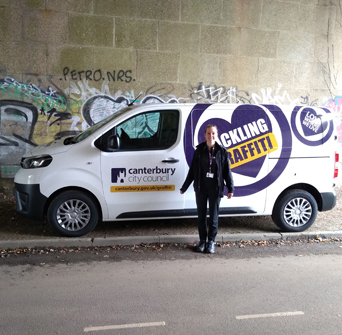The December 2020 print edition of Professional Security magazine will feature graffiti, and its removal – not only for situational crime prevention reasons (graffiti according to ‘broken windows’ theory may make a street look unloved and lawless, and put off shoppers and traders, and lead to further crime and anti-social behaviour) but maybe because of any sectarian or other hate-crime slogans, bad from a community cohesion point of view. National Hate Crime Awareness Week has recently run in the UK.
Pictured is a new recruit to Canterbury City Council; environmental enforcement graffiti officer Nicole Holt. She has a background in public health and was a researcher and sessional academic at Canterbury Christ Church University. She said: “The Enforcement and Contracts teams from the council remove hundreds and hundreds of tags every year at an enormous cost to the council taxpayer but we are hoping to take it to the next level to prove to taggers that it is not worth wasting their paint or ink.
“The more our knowledge of the taggers and their tags increases, helped by information gained because of our offer of a £500 reward, so does their chances of getting caught and being dealt with by the police. Prevention is the other side of the coin so we need to help people protect their property from being tagged and that is why we’re excited about our toolkit being launched this week.
“We also need to remind shops of their obligations not to sell spray paints to anyone under the age of 16.”
In recent weeks, the council has gone to work in the suburb of Wincheap to remove as much graffiti as possible, besides city centre work with the Canterbury BID (Business Improvement District) to clean graffiti from business fronts; and to stop it in the first place by applying vinyls on the windows of empty shops.
Lisa Carlson, Chief Executive of the Canterbury BID said: “It is important for Canterbury businesses that the city looks clean and welcoming to visitors. The removal of graffiti is an essential part of this work and we were pleased to be working in partnership with Canterbury City Council to help tidy up areas of the city that have suffered from repeated graffiti tagging.”
Similar work happens with Kent County Council, Kent Highways and utilities such as BT whose property is among targets for graffiti.
Chair of Canterbury City Council’s Community Committee, councillor Joe Howes, said: “We live in a beautiful and historic part of the world and it breaks my heart to see it blighted in this way. The vandalism caused by taggers is often labelled mindless but I disagree. To buy a spray can or permanent marker and find somewhere to use it is a very deliberate act of criminal damage that costs innocent property owners and the council taxpayer thousands and thousands of pounds to put right.
“At a time when businesses and the council are battling to overcome the enormous challenges caused by the pandemic, forcing them to divert their cash and resources away from the frontline is simply selfish.
“It is important we all take the time to report graffiti to the council and Kent Police so both organisations can see the extent of the problem, gather evidence and take action as quickly as possible.”









